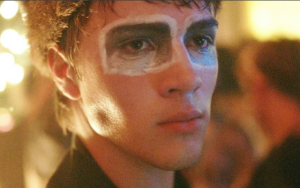CLOSET MONSTER: 4 STARS. “BEAUTIFULLY MADE, ECLECTIC FILM WITH STYLE AND GUTS.”
 Newfoundland director Stephen Dunn’s feature debut is an odd movie. “Closet Monster” pays tribute to “Buffy the Vampire Slayer” and features a talking hamster spirit animal voiced by Isabella Rossellini. It’s also a beautifully made, eclectic film that breathes new life into the coming-of-age-and-out-of-the-closet genre.
Newfoundland director Stephen Dunn’s feature debut is an odd movie. “Closet Monster” pays tribute to “Buffy the Vampire Slayer” and features a talking hamster spirit animal voiced by Isabella Rossellini. It’s also a beautifully made, eclectic film that breathes new life into the coming-of-age-and-out-of-the-closet genre.
Oscar (played as a youngster by Jack Fulton) is a child of a broken home who witnessed a grim act of gay bashing which left a young man paralyzed from the waist down.
Years later memories of the violent attack and his father’s (Aaron Abrams) homophobia—when he asks his father why the boy was beaten, the old man says, “Because he’s gay.”—have left Oscar (now played by Connor Jessup) feeling repressed, as though being gay was something that should never be talked about, let alone acknowledged. An imaginative kid, he has aspirations of leaving Newfoundland, moving to New York and becoming a makeup artist for horror and fantasy movies.
As a teen when Oscar develops a crush on hardware store co-worker Wilder (Aliocha Schneider) he finds himself still scarred from the trauma of his youth. His conditioned response is to filter his newfound feelings through a blend of aggressive fantasy flashbacks. His friends, Gemma (Sofia Banzhof) and Buffy (a hamster voiced by Rossellini) help ground him as he searches to find himself.
Perhaps because the story is loosely autobiographical Dunn is able to take what may have been a gimmicky story—talking hamsters! Gory make-up fever dreams!—and ground it, if not exactly in reality, then in a world that feels heightened but authentic. He’s aided by a great, naturalistic performance from Jessup who manages to keep the character earthbound and relatable even when the story takes off on existential flights of fancy.
“Closet Monster” confronts its issues head on, whether it is death—“Your parents replaced me,” says Buffy, “like, four times.”—grappling with sexuality or homophobia and does so with style and guts.
